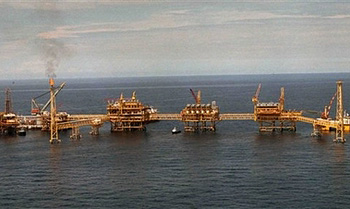 |
 |
 |
 Business News | March 2007 Business News | March 2007  
Mexico Says Oil Monopoly Struggling
 Mark Stevenson - Associated Press Mark Stevenson - Associated Press


| | In this undated file photo provided by Mexico's national oil company, Pemex, an offshore oil installation is seen in the gulf of Mexico near the coast of Campeche, Mexico. As debts mount for Pemex, which commemorated its 69th anniversary Sunday, the company faces bigger challenges. Pemex's main shallow-water Cantarell oil field off the Gulf coast is slowly running out of oil, while the company struggles with leaky pipelines that have led to spills and explosions. (AP/Pemex) |
Mexico's state oil monopoly is in "critical" condition and needs to boost exploration and seek outside expertise to replenish oil reserves that are currently set to last less than a decade, energy officials said Sunday.

President Felipe Calderon, however, said during a ceremony marking the 69th anniversary of the nation's oil nationalization that there are no plans to privatize the industry and that Petroleos Mexicanos, or Pemex, "will always continue to belong to all Mexicans."

Pemex's proven reserves have fallen to the equivalent of 9.3 years of production from 9.7 years in 2005, and daily output declined last year by 2.3 percent to about 3.2 million barrels, officials said at the ceremony in the Gulf coast state of Veracruz.

"The situation of Petroleos Mexicanos is critical and merits immediate attention," Pemex Chief Executive Jesus Reyes Heroles said.

The company currently transfers most of its income to the government in taxes and revenue sharing, leaving little for investment. Pemex sent 93.2 percent of its profits to the government last year, accounting for 37.5 percent of federal income.

At the end of last year, proven reserves were 5.8 percent lower than in 2005. And production at the Cantarell oil field, the country's biggest, fell by 11.9 percent last year.

"We should be conscious that this situation cannot go on," said Energy Secretary Georgina Kessel, referring to policies that bar Pemex from entering joint ventures and alliances.

She said Mexico must seek "complementary investment," especially in technology and scientific knowledge, in order to develop energy infrastructure projects.

"If we do not confront and resolve the problems posed by these challenges, the situation of Petroleos Mexicanos could be become unsustainable over the long term."

Mexico's constitution, however, currently bans private or outside investment in Pemex. Private companies are currently allowed to serve as outside contractors on specific projects.

"We have to invest, and invest seriously, in exploration and turn this situation around," Calderon said.

He said one option was to form strategic alliances to explore for new reserves in deep waters off the Gulf of Mexico.

Reyes Heroles said the company replaced 41 percent of production with new reserves last year, up from 26.4 percent in 2005 but well below the 100 percent, complete-replacement level officials are seeking.

In real terms, he said, Pemex's exploration budget in last year was 17 percent less than in 2005 and 42 percent less than in 2004.

Pemex funds many of its projects by assuming debt, which rose by about 9.8 billion pesos ($880 million) last year to about $51 billion. In addition, the company has about $40.7 billion in labor-related debts and commitments.

Reyes Heroles said Pemex remains the most indebted oil company in the world. He also said the company continues to be a target for fuel thieves, with 207 illicit openings discovered in pipelines or valves last year.

Officials also pushed for building more refinery capacity, noting Mexico now imports about 40 percent of its gasoline. The country is also a net importer of petrochemical products. | 
 | |
 |



